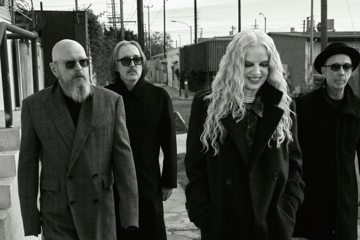You're Not Great Just Because You Play Music
"A lot of people make music, you don't need to pretend that you're great just because you do."
Goat are a mysterious, psychedelic Swedish collective, whose latest LP is suggestively called Commune. Their membership is kept secret; the band wearing masks on stage and in photos, their names never divulged. They don't tour much, and almost never do interviews. When offered the unexpected opportunity to talk to one of Goat's members, we're only given the name 'Goatman', which doubles as the title of the band's first single. When dialling his number, we wonder who we're calling, where they might be, what they'll be like to talk to. It turns out Goatman is jovial and affable, in Gothenburg, and "at home doing some vacuum cleaning". If that sounds mundane, so is Goat's reason for anonymity, which is preserved so they can go about daily lives that involve kids and jobs.
"It's about freedom," explains Goatman. "Artistic freedom. Personal freedom. Freedom from recognition, freedom in your life away from the band. If you don't connect your name to what you do, then it's easy to have no ego, to keep your feet on the ground. Where we're from, in the north of Sweden, there's this thing called the Jante Law, which is the belief that you're not better than anyone else, and that you should never make any fuss about what you do. A lot of people make music, you don't need to pretend that you're great just because you do."
"If you don't connect your name to what you do, then it's easy to have no ego, to keep your feet on the ground."
Such anonymity seems especially contrary — and appealing — in the overshare era, where artists are expected to perform as much on social media as they do on stage. "All of us in Goat don't have Twitter accounts," Goatman says. "We can't run our band Facebook page because none of us have personal Facebook accounts. I've never had a Facebook account, and I would never create one. I'm not interested in sharing my mundane daily thoughts, nor reading anyone else's. It just takes up so much time, for so little reward. We as Goat don't place any value in spreading the news about what we ate for dinner. We make music; if people want to hear it, fine."
Don't miss a beat with our FREE daily newsletter
Goat's music first came to people's attention on their debut LP — 2012's World Music, an album whose title was dripping in irony. "The idea that only music not sung in English should be called 'world music' is ridiculous. All music is world music. All music that's created by anyone on this planet belongs to all people to use. All music consists of other music already created; it picks up parts of all music that has ever been, and comes out of you in another way, your own way. But you haven't invented something new, you've just continued on in a tradition."
And Goat's music definitely picks up on tradition: not just of psych-rock, but the percussion-driven ritualism that connects back to ancient ancestors. "You use the tools you have — music, spirituality, whatever — to expand your mind, reach further, try to go into some other space and time," says Goatman. "All music, not just psychedelic music, can achieve that feeling in people. Historically, that's why humans have made music, made it a part of rituals. With us, it's the same thing. You shouldn't be pretentious about it — we are just a band — but, for some people, a one-hour rock'n'roll show can have the same qualities as a shamanic ritual."







